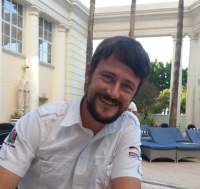- Forum
- categories
- Markets, finance and governance
- Market development in action
- Mobile phones, ICT for sanitation (Information and communications technology)
- Knowledge sharing on mobile phone for water, sanitation, and hygiene applications
Knowledge sharing on mobile phone for water, sanitation, and hygiene applications
23.3k views
- ennoschroeder
-
 Less
Less- Posts: 30
- Karma: 4
- Likes received: 12
Re: Knowledge sharing on mobile phone for water, sanitation, and hygiene applications
just a quick reply to your posting Jürgen:
Apart from the aggresive marketing which is done for mobile phones and the case that there is a lack of functional and affordable mobile toilet(s systems), a core issue in slum areas for instance is that the fluctuation is super high and ownership very low (often, people are tenants which frequently have to move). So a perfect thing would be something like the MoSan toilet. People could purchase the unit and just carry it around when they move.
But there is another very important thing which I would like to add here: Unlike mobile phones, toilets are not a status symbol. And this is exactly what has to be changed by e.g. designing proper (mobile) toilets, marketing campaigns for those toilets, using SMS services, using media (e.g. soap operas), including it in school curricula, in a nutshell: mainstream it...
Thanks for the discussion and best regards,
Enno
Freelance consultant
Hamburg, Germany
This email address is being protected from spambots. You need JavaScript enabled to view it.
Member of SuSanA (www.susana.org)
Please Log in to join the conversation.
You need to login to reply- Kiku
-

- Water and Sanitation Specialist
Less- Posts: 38
- Karma: 6
- Likes received: 18
Re: Knowledge sharing on mobile phone for water, sanitation, and hygiene applications
Skype: tufre80
Please Log in to join the conversation.
You need to login to replyRe: Knowledge sharing on mobile phone for water, sanitation, and hygiene applications
ijgossejeroen wrote: Why is that cultures all over the world have embraced this device / technology with such eagerness and willingness to pay (highly) for its use, and at the same time achieving this same eagerness and willingness to pay for sanitation has proven to be much more difficult. Is that we as humans (all over the world) care more about talking than we do about our own health (and that of our children´s)?
Yes.
It's a very good (rhetoric) question and I also believe that the mobile communication sector isn't that much different - which btw also depends on a working base station grid and handsets that need to be recharged with energy and credit.
I think the difference between decent sanitation and mobile phones is the portability/mobility as both already provide freedom and individuality. And mobile communication also means business opportunities for users which sanitation does not (yet).
This, coupled with aggressive marketing strategies and availability of solutions (~ subsidized or cheap phones, cheaper base stations - GSM has been around for many years) imo is why the mobile communication sector took off while the wash sector is only slowly progressing forward.
It's also interesting to note how much money the communication consortia invested in service licences / frequency allocations. Could a similar exclusiveness also be guaranteed to wash providers who would be e.g. be bidding on service licenses for municipalities or countries?
watsan eng.
water, sanitation, IT & knowledge management
www.saniblog.org
Toilets in Frankfurt/Main www.facebook.com/ffmtoi
Please Log in to join the conversation.
You need to login to replyRe: Knowledge sharing on mobile phone for water, sanitation, and hygiene applications
Following an invitation from Elisabeth von Münch to post this presentation which I shared with her and fellow team members from the solid waste and sanitation departament at GiZ, I am attaching a presentation I made in 2008 after a visit to the interior of Suriname in South America.
Walking around in the villages along the rivers in the jungle whilst on an evaluation misison for the ISSUE-1 program I was struck by stark contrast between the sanitation situation and the access of mobile telephone.
It let to this presentation called ´digicel´.
One of the main questions that arose during my visit is, what can the sanitation (and solid waste) sector learn from the quick acceptability and integretation into society that the mobile phone has achieved over the last 15 odd years. Why is that cultures all over the world have embraced this device / technology with such eagerness and willingness to pay (highly) for its use, and at the same time achieving this same eagerness and willingness to pay for sanitation has proven to be much more difficult. Is that we as humans (all over the world) care more about talking than we do about our own health (and that of our children´s)?
I´ll be interested to learn your reflections on this issue.
Kind regards Jeroen
This message has an attachment file.
Please log in or register to see it.
Please Log in to join the conversation.
You need to login to replyRe: Knowledge sharing on mobile phone for water, sanitation, and hygiene applications
mWASH: Mobile Phone Applications for the Water, Sanitation, and Hygiene Sector
Billions of the world’s poor still lack access to basic water and sanitation services, yet many of them can count mobile phones among their possessions. Water and sanitation practitioners have begun to tap the potential of these phones as tools to improve water, sanitation, and hygiene (WASH) services. A new report from the Pacific Institute and Nexleaf Analytics assesses how these “mWASH” solutions can amass and disseminate information quickly and thoroughly – directly to or from the underserved populations most in need of service from water providers.
“The urban and rural poor often have no way to advocate for their basic needs for water and sanitation because their problems are invisible to higher levels of delivery, planning, and policymaking,” said Meena Palaniappan, director of the Pacific Institute International Water and Communities Initiative. “Information is powerful, yet scarce, when it does not have to be. A mobile phone WASH solution can fill information gaps by transforming the way data is generated, communicated, and shared – giving people a real and direct voice.”
Ms. Palaniappan released the report in a presentation at the International Water, Sanitation, and Hygiene Symposium at the University of California, Berkeley on May 4, 2012. The new study, mWASH: Mobile Phone Applications for the Water, Sanitation, and Hygiene Sector, analyzes how mobile technology applications are already being tapped in many areas, such as health, agriculture, and disaster relief, as well as WASH.
“These mobile solutions demonstrate that gathering and analyzing data from remote regions and making the information available in a transparent way can help identify where investments are most urgently needed, improve long-term project monitoring, and contribute to better water resources planning,” said Misha Hutchings, research associate at the Pacific Institute and lead author of the report.
“We aimed to capture a snapshot of existing mobile phone platforms to assist in developing an effective solution to improve transparency and enhance communication for the global water, sanitation, and hygiene sector,” said co-author Nithya Ramanathan of Nexleaf Analytics. “Mobile phones are powerful mechanisms to serve the needs of the poorest, most vulnerable populations, because they represent a ubiquitous, relatively low-cost, and easy-to-use communication option for rapid information transfer and service facilitation.”
The ten case studies in the mWASH report call out lessons critical for developing robust mWASH applications. Most mobile phone solutions have great potential, fueled by desires to bring rapid and effective change, but their success will ultimately depend on program management planning for financial and technical sustainability, and measuring system effectiveness in the short and long-term.
The researchers conducted a global survey and identified more than forty mobile phone projects worldwide, selecting ten organizations for further study, including five in the water, sanitation, and hygiene sector: FLOW, Human Sensor Web, Maji Matone, NextDrop, and Water Quality Reporter. Interviews with each organization revealed key decision points on technical, social, and program design, as well as principles for the success of mobile phone applications relevant to WASH. They concluded that for mWASH solutions to provide the underserved the information they need and a voice with water providers and government agencies, the developers must understand that:
- socio-cultural context is critical and user participation is driven by ease of use;
- mobile phone solutions can provide high-quality data, and users must have access to that data;
- responsiveness of government authority is necessary to ensure users’ long-term interest;
-securing a future for the system requires a plan for long-term sustainability right at the outset.
It is increasingly recognized that efforts to improve water supply, sanitation, and hygiene in the long term depend on addressing the underlying issue of inadequate governance in the WASH sector, which is exacerbated by poor information on water resources and the needs of the poor. Technology that innovates the ways in which data is generated can help in overcoming this challenge, allowing for direct and real-time data generation and collection from larger numbers of people, often at little cost.
Mobile phone technology is making it easier for people to access information – and it is spurring demand for information access and transparency. Technology is also enabling communities to coalesce around issues of concern and making communication between stakeholders more immediate. Governments can increase service provision to underserved and vulnerable communities, alert residents to service changes, and aggregate data on informal water services, unserviced areas, and aquifer levels, as well as assess and prepare for risks associated with climate variability and change. Using SMS, email, or the web, citizens and residents can remotely report conditions such as poor water quality and sewage backflow, register lack of infrastructure to aid in network expansion, and view information on the status of service provision and problem resolution.
The Pacific Institute, in collaboration with Nexleaf Analytics, is using this mWASH research in its project funded by USAID Development Grants Program (DGP) to build the open-source WASH SMS System, a highly accessible communication and monitoring system that relies on mobile phones and email to develop crowd-sourced map data to improve water and sanitation services for the urban poor. The system is being developed through a pilot project with Indonesian partner PATTIRO and serves two major metropolitan areas in Indonesia that are on the verge of water crises among their urban poor. The project includes extensive collaboration between Indonesian citizens, public and private water service providers, and government agencies.
This analysis was made possible through the generous support of USAID and the Cisco Foundation.
watsan eng.
water, sanitation, IT & knowledge management
www.saniblog.org
Toilets in Frankfurt/Main www.facebook.com/ffmtoi
Please Log in to join the conversation.
You need to login to replyRe: Knowledge sharing on mobile phone for water, sanitation, and hygiene applications
I think since it's based on Ushahidi and the Huduma tuning, the db will look like a typical Ushahidi setup ==> wiki.ushahidi.com/display/WIKI/Database+Schema+Diagram
SMS costs imo also depend on the availability of a local shortcode (1234 instead of 0123-1234567) which could reduce sms costs for stakeholders. I think most people will only make use of any such reporting tool once they see a direct benefit in it. It is against this background I am glad they are piloting it in Indonesia and not in Kenya. ;-D
watsan eng.
water, sanitation, IT & knowledge management
www.saniblog.org
Toilets in Frankfurt/Main www.facebook.com/ffmtoi
Please Log in to join the conversation.
You need to login to reply- tmsinnovation
-

- Moderator
- I manage the Decentralized Wastewater Management for Adaptation to Climate Change in Jordan (ACC Project) and previously coordinated the Climate-friendly sanitation services in peri-urban areas of Lusaka project in Zambia. My background is in Management, Economics and Information Systems.
Less- Posts: 162
- Karma: 4
- Likes received: 53
Re: Knowledge sharing on mobile phone for water, sanitation, and hygiene applications
Nexleaf looks like an interesting organisation, they do not yet have anything on their website about the WASH SMS project. I would be interested in some of the more technical details, any idea where I could find info about the database structure, info to be sent via sms, costs of the sms for the user and so on?
Decentralized Wastewater Management for Adaptation to Climate Change in Jordan (ACC Project)
Project Manager
Deutsche Gesellschaft für
Internationale Zusammenarbeit (GIZ) GmbH
Ministry of Water and Irrigation, Shmeisani,
Amman
Jordan
Please Log in to join the conversation.
You need to login to replyKnowledge sharing on mobile phone for water, sanitation, and hygiene applications
WASH SMS is an open-source communication and tracking mechanism that uses messages from mobile phones to develop crowd-sourced data in the form of maps and reports for use by communities, utilities, government agencies, and NGOs. The team behind WASH SMS is interested in connecting with others implementing similar projects which facilitate information exchange and coordination to support improvements in water supply, sanitation, and hygiene in the short and long term.
The WASH SMS system provides an immediate, transparent and multi-directional way for utilities and customers to manage existing problems and also better plan for the future. It allows for the development of data direct from the community as an alternative information source about the status of water at the local level. It helps develop and empower citizen voices to advocate for what they need, and assists local governments and utilities to meet community needs and plan for the future.
WASH SMS builds on successful open-source systems like Ushahidi and Huduma, and extends these to enable both reporting and information viewing by residents focus on information for urban water and sanitation service delivery and long-term monitoring, and open up multi-channel communication among residents, utilities, local government, and the informal water sector. The features of the platform (currently in pilot development in two Indonesian cities) include:
- Multi-directional communication
- Community-driven list of issues
- Support for unstructured report submissions
- Automated responses to obtain more information for complete reports
- Automated data mapping
- Regional broadcasting function
- Multiple report formats to meet multiple stakeholder needs
- Data collection and tracking for use in short-term issue resolution, and long-term planning
- An issue tracking website for system and participation monitoring to identify any system problems and track the number of participants by location and time
WASH SMS is being developed by Nexleaf Analytics (nexleaf.org) and Pacific Institute (pacinst.org), through a pilot project in Indonesia. We are interested in sharing the above enhancements with other implementers and developers in order to learn from each other during the development phase. If you are interested, or for further information about this project, please contact Misha Hutchings, Project Manager, at xxxx, or Meena Palaniappan, Project Director, at xxxxx (e-mail addresses removed)
src: groups.google.com/forum/?fromgroups#!top...-discuss/hVxL-Br7VGk
watsan eng.
water, sanitation, IT & knowledge management
www.saniblog.org
Toilets in Frankfurt/Main www.facebook.com/ffmtoi
Please Log in to join the conversation.
You need to login to reply- Forum
- categories
- Markets, finance and governance
- Market development in action
- Mobile phones, ICT for sanitation (Information and communications technology)
- Knowledge sharing on mobile phone for water, sanitation, and hygiene applications







